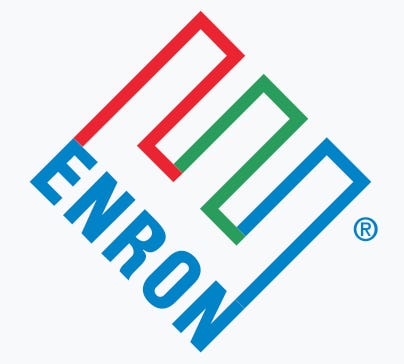There are three big stories that one can tell about the dotcom crash.
The first is an overvalued-startup story. Think Pets.com. Startups were massively overvalued. New companies were going public with no revenues and no business model. Everyone pretty much knew it was a bubble. But for years it kept inflating anyway.
The second is a telecom story. Think Global Crossing. It was clear to a whole lot of companies that the future of the internet would involve fast connections over fiber optic cables. The telecom industry flooded the market with cheap fiber, underestimating the costs and overestimating demand.
And then there’s the Enron story. Ben Riley wrote an excellent piece earlier this year titled EnronAI, revisiting Enron’s role in the crash. The Enron story is fundamentally about accounting fraud, but it was very complicated accounting fraud. Enron played fancy math shell games.
You can see echoes of all three stories in the current AI bubble. We have AI startups valued at $12 billion before announcing any product. Capital expenditures on AI now account for something like 40% of U.S. economic activity. And the big players are all engaged in (ahem) “circular deals” so complicated you need to subscribe to Matt Levine’s newsletter to have the faintest chance of understanding them.
Even Sam Altman says we’re in an AI bubble right now. But what he has in mind is the first version of this story. The dotcom bubble had Pets.com, but also Amazon. Altman figures there are a lot of Pets.coms out there right now, but his company is the equivalent of Amazon.
But with the latest wave of multibillion- and trillion-dollar dealmaking among the largest AI players, the vibes are turning decidedly Enron-like. Nvidia announced it is investing $100 billion in OpenAI, which OpenAI will then use to purchase Nvidia products. OpenAI announces a deal to buy $78 billion in chips from AMD, and is awarded 10% of the company in the deal, effectively offsetting the purchase.
None of these astronomically high-dollar deals are necessarily accounting fraud. It wasn’t clear in 2000 that Enron was accounting fraud either, though. Read Ben Riley. Enron was doing cutting-edge financial valuation something-or-other. Low-level and mid-level bankers couldn’t make sense of it, but they were overruled by their bosses who saw a feeding frenzy and wanted a seat at the table. It created a ton of shareholder economic value, right up until the whole thing vaporized itself. The same was true of FTX in 2022. If the crypto market hadn’t precipitously dipped, the fraud at the center of FTX never would’ve been exposed.
What we can say for certain right now is that these massive deals are based on increasingly complex financial shell games. OpenAI — a company that constantly needs fresh injections of investor cash, because its costs are bigger than its revenues — keeps announcing deals to spend billions of dollars to acquire stakes in chip manufacturing companies. Unless they invent digital god and completely transform the entire global economy, like, really pretty soon, they’re inevitably going to run into some hard accounting realities.
The AI bubble isn’t predominantly giving off Pets.com or Global Crossing vibes anymore. It’s giving Enron vibes. When the dust settles, we’ll probably see a whole lot of books written about the fancy math games that convinced investors that two companies passing $100 billion back and forth were creating $200 billion in value instead of having a net financial impact of $0.



So for most of us we’ll just have to go back to standard googling, eh?